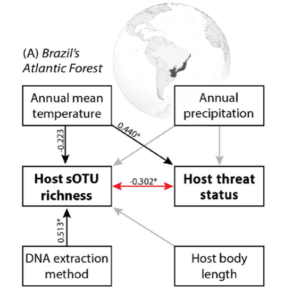 In a new study published in Animal Microbiome, the Woodhams lab contributed to the discovery that threatened amphibians carried lower skin bacterial diversity, after accounting for key environmental and host factors. The consistency of our findings across continents suggests the broad scale at which low bacteriome diversity may compromise pathogen defenses in species already burdened with the threat of extinction.
In a new study published in Animal Microbiome, the Woodhams lab contributed to the discovery that threatened amphibians carried lower skin bacterial diversity, after accounting for key environmental and host factors. The consistency of our findings across continents suggests the broad scale at which low bacteriome diversity may compromise pathogen defenses in species already burdened with the threat of extinction.
Greenspan SE, Peloso P, Fuentes-Gonzalez JA, Bletz M, Lyra ML, Machado IF, Martins RA, Medina D, Moura-Campos D, Neely WJ, Preuss J, Sturaro MJ, Vaz RI, Navas CA, Felipe Toledo L, Tozetti AM , Vences M, Woodhams DC, Haddad CFB, Pienaar J , Becker CG. 2022. Low microbiome diversity in threatened amphibians from two biodiversity hotspots. Animal Microbiome, (2022) 4:69.
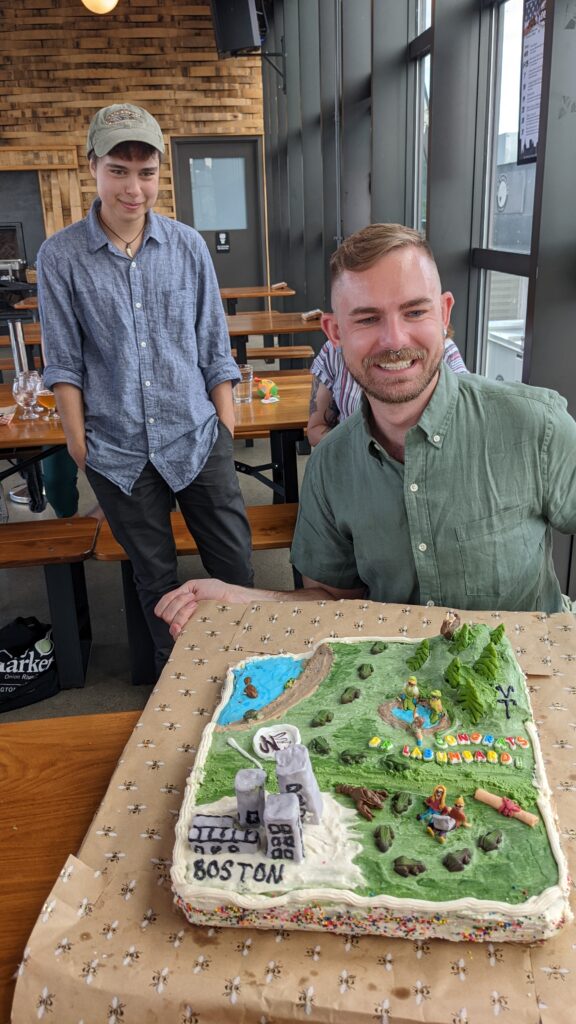 Congratulations to graduate students finishing in 2022 and advancing their careers. Dr. Brandon LaBumbard (now at Arcaea), Aura Muñiz (Ph.D. student at Purdue University), and Julia McCartney (now at GRO Bio).
Congratulations to graduate students finishing in 2022 and advancing their careers. Dr. Brandon LaBumbard (now at Arcaea), Aura Muñiz (Ph.D. student at Purdue University), and Julia McCartney (now at GRO Bio).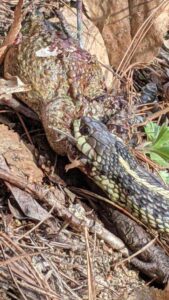 To facilitate creative disease ecology research, and to encourage compassionate solutions from the next generation of conservation researchers,
To facilitate creative disease ecology research, and to encourage compassionate solutions from the next generation of conservation researchers,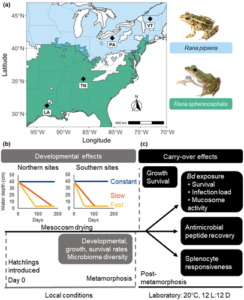 Woodhams lab and SERDP project on climate change impacts on amphibians published in EcoSphere. Mmultifaceted effects of climate change on pathogen defenses are increasingly relevant as emerging infectious diseases threaten global biodiversity.
Woodhams lab and SERDP project on climate change impacts on amphibians published in EcoSphere. Mmultifaceted effects of climate change on pathogen defenses are increasingly relevant as emerging infectious diseases threaten global biodiversity. Dr. Pat Kearns to contribute expertise in soil and salt marsh microbial ecology to study of amphibian disease resilience as a new Research Assistant Professor in the Woodhams lab and member of RIBBiTR –
Dr. Pat Kearns to contribute expertise in soil and salt marsh microbial ecology to study of amphibian disease resilience as a new Research Assistant Professor in the Woodhams lab and member of RIBBiTR –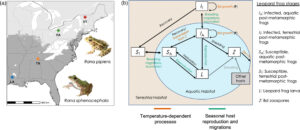
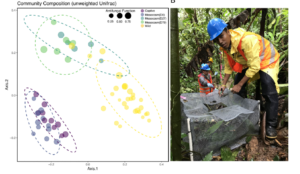 One species exhibiting a large skin microbiome shift in captivity is the variable harlequin frog, Atelopus varius. A soft-release of A. varius to outdoor mesocosms “restored” the microbiome through time, and frogs also increased antifungal function of their skin microbiome with time in mesocosms. Rewilding the microbiome may influence resistance to diseases such as chytridiomycosis.
One species exhibiting a large skin microbiome shift in captivity is the variable harlequin frog, Atelopus varius. A soft-release of A. varius to outdoor mesocosms “restored” the microbiome through time, and frogs also increased antifungal function of their skin microbiome with time in mesocosms. Rewilding the microbiome may influence resistance to diseases such as chytridiomycosis.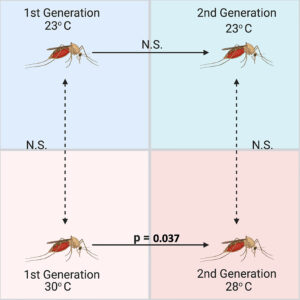
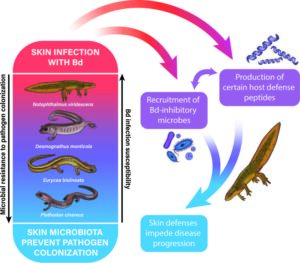 Salamanders with highest Bd infection intensity showed greater mucosome function. Bd infection prevalence significantly decreased as putative Bd inhibitory bacterial richness and relative abundance increased on hosts. In co-occurrence networks, some putative Bd-inhibitory bacteria were found as hub-taxa.
Salamanders with highest Bd infection intensity showed greater mucosome function. Bd infection prevalence significantly decreased as putative Bd inhibitory bacterial richness and relative abundance increased on hosts. In co-occurrence networks, some putative Bd-inhibitory bacteria were found as hub-taxa.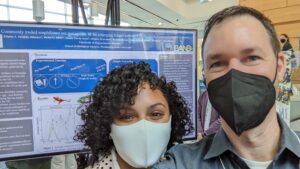 In an article in Diseases of Aquatic Organisms, the Woodhams lab and collaborators provide a resource for the scientific community on best practices for biosecurity when working in the lab with wildlife pathogens such as Batrachochytrium salamandrivorans. The authors recommend responsibly containing pathogens is up to individual labs and institutional oversight may not be adequate.
In an article in Diseases of Aquatic Organisms, the Woodhams lab and collaborators provide a resource for the scientific community on best practices for biosecurity when working in the lab with wildlife pathogens such as Batrachochytrium salamandrivorans. The authors recommend responsibly containing pathogens is up to individual labs and institutional oversight may not be adequate.